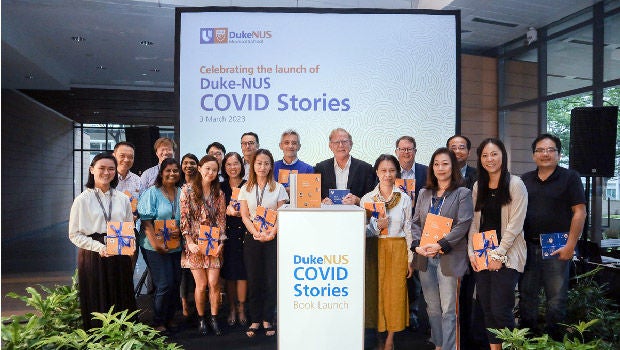
Duke-NUS senior management with the researchers, clinician-scientists and alumni featured in the book.
Duke-NUS scientists, researchers and leaders filled the Atrium of the Khoo Teck Puat building on Friday, 3 March, to celebrate the launch of a new book about the School’s collective accomplishments, innovations and discoveries made in the fight against COVID. Titled Duke-NUS COVID Stories, the book chronicles these milestones alongside the personal stories of the researchers, clinician-scientists and alumni who made the discoveries.
Before the book was unveiled, Duke-NUS Dean Professor Thomas Coffman reflected on the pandemic in a pre-recorded message: “It was a challenging time for everyone around the world and for the staff and faculty. But I am so proud of the way we responded, the resilience, the way we supported one another. And scientifically, we really punched above our weight.”
Expanding on Prof Coffman’s comments, Senior Vice-Dean for Research Professor Patrick Casey added: “What you are going to see in this book are some wonderful stories. And not unexpectedly they focus on our Emerging Infectious Diseases Programme, they focus on our BSL3 [biosafety level 3 lab] and the staff that kept that going and all the terrific work they did. But I want to acknowledge in addition folks that didn’t end up in this book that did some amazing things in the past three years.”
From volunteering at quarantine facilities and staffing wards to ensuring that research work could continue, everyone at Duke-NUS pitched in, said Prof Casey: “It just reminds us every day that people matter. People can make a difference. Everybody can make a difference in the end. And hopefully this is going to make a difference in helping us be ready for the next time [a pandemic] comes because it probably will come again in our lifetimes and we’re going to be much more ready.”
Leading up to the launch of the book, a short animation took the audience back in time to revisit their major accomplishments as they happened amidst the unfolding pandemic.
Following this peek into one half of the book, Prof Casey, along with Senior Vice-Dean for Corporate Services Ms Karen Chang, Emerging Infectious Diseases Programme Director Professor Gavin Smith, immediate past Director Professor Wang Linfa and Deputy Director of Duke-NUS’ Centre for Pandemic Preparedness Assistant Professor Rukie de Alwis, officially unveiled the book and its two covers. While the milestones are accessed via its orange cover, the blue cover opens the personal stories, which contained the biggest reveal of the evening: hand-drawn portraits of the interviewees.
Through a second animation, introducing the other half of the book, the assembled audience met the people whose contributions helped Duke-NUS, Singapore and the world chart a way forward.
When asked to name her highlight of the evening, Principal Research Scientist Dr Eugenia Ong, whose story is captured in the book said, “Seeing the book and receiving these thoughtfully drawn portraits.”
“We are used to writing our own experience in journals,” reflected Dr Danny Tng, an adjunct research fellow and Duke-NUS alumnus from the Class of 2019, “having a third person tell our story is very different. But I hope my juniors will be encouraged to take up similar roles next time.”
Speaking about the motivation behind the project, Director of Communications & Strategic Relations Mr Anirudh Sharma said: “Throughout the pandemic, our people—scientists, clinician-scientists and educators alike—provided solutions, clarified mis- and disinformation and went the extra mile to help the world. Now that we are emerging from the immediate shadow of COVID, we wanted to pay tribute to all their great work by capturing those hectic and intense early days and sharing the moments of inspiration that led to their discoveries. We are delighted by the amazing feedback we have received from readers so far.”
While the book focuses on the pandemic era, the Duke-NUS communications team created a complementary microsite that continues the stories that started with the arrival of SARS-CoV-2.













 Get it on Google Play
Get it on Google Play